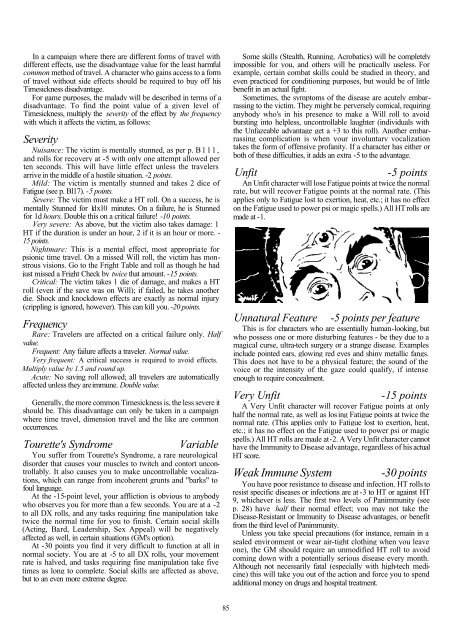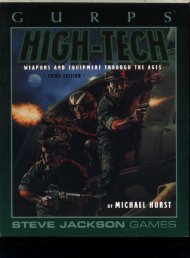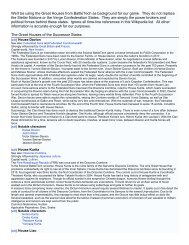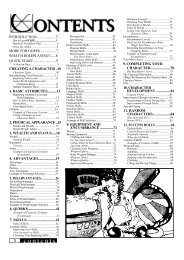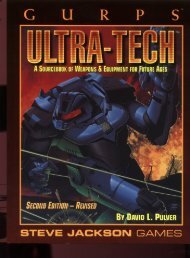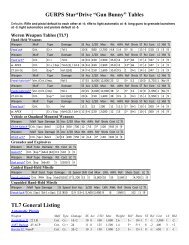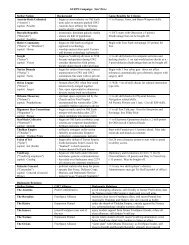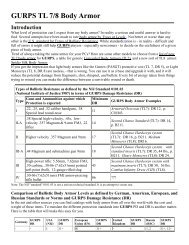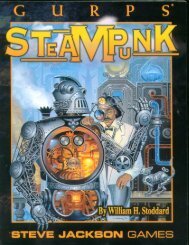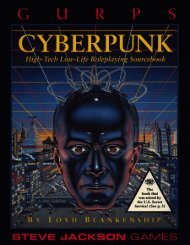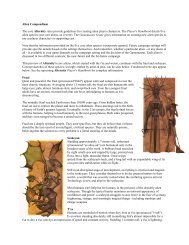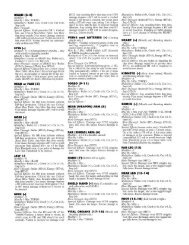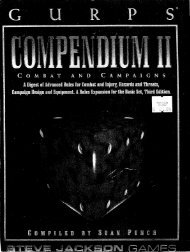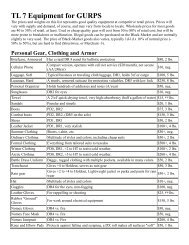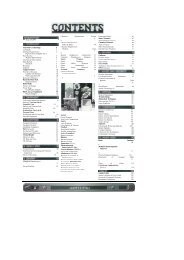GURPS - Compendium 1..
GURPS - Compendium 1..
GURPS - Compendium 1..
You also want an ePaper? Increase the reach of your titles
YUMPU automatically turns print PDFs into web optimized ePapers that Google loves.
In a campaign where there are different forms of travel with<br />
different effects, use the disadvantage value for the least harmful<br />
common method of travel. A character who gains access to a form<br />
of travel without side effects should be required to buy off his<br />
Timesickness disadvantage.<br />
For game purposes, the malady will be described in terms of a<br />
disadvantage. To find the point value of a given level of<br />
Timesickness, multiply the severity of the effect by the frequency<br />
with which it affects the victim, as follows:<br />
Severity<br />
Nuisance: The victim is mentally stunned, as per p. B111,<br />
and rolls for recovery at -5 with only one attempt allowed per<br />
ten seconds. This will have little effect unless the travelers<br />
arrive in the middle of a hostile situation. -2 points.<br />
Mild: The victim is mentally stunned and takes 2 dice of<br />
Fatigue (see p. Bl17). -5 points.<br />
Severe: The victim must make a HT roll. On a success, he is<br />
mentally Stunned for 1dxl0 minutes. On a failure, he is Stunned<br />
for 1d hours. Double this on a critical failure! -10 points.<br />
Very severe: As above, but the victim also takes damage: 1<br />
HT if the duration is under an hour, 2 if it is an hour or more. -<br />
15 points.<br />
Nightmare: This is a mental effect, most appropriate for<br />
psionic time travel. On a missed Will roll, the victim has monstrous<br />
visions. Go to the Fright Table and roll as though he had<br />
just missed a Fright Check by twice that amount. -15 points.<br />
Critical: The victim takes 1 die of damage, and makes a HT<br />
roll (even if the save was on Will); if failed, he takes another<br />
die. Shock and knockdown effects are exactly as normal injury<br />
(crippling is ignored, however). This can kill you. -20 points.<br />
Frequency<br />
Rare: Travelers are affected on a critical failure only. Half<br />
value.<br />
Frequent: Any failure affects a traveler. Normal value.<br />
Very frequent: A critical success is required to avoid effects.<br />
Multiply value by <strong>1.</strong>5 and round up.<br />
Acute: No saving roll allowed; all travelers are automatically<br />
affected unless they are immune. Double value.<br />
Generally, the more common Timesickness is, the less severe it<br />
should be. This disadvantage can only be taken in a campaign<br />
where time travel, dimension travel and the like are common<br />
occurrences.<br />
Tourette's Syndrome<br />
Variable<br />
You suffer from Tourette's Syndrome, a rare neurological<br />
disorder that causes your muscles to twitch and contort uncontrollably.<br />
It also causes you to make uncontrollable vocalizations,<br />
which can range from incoherent grunts and "barks" to<br />
foul language.<br />
At the -15-point level, your affliction is obvious to anybody<br />
who observes you for more than a few seconds. You are at a -2<br />
to all DX rolls, and any tasks requiring fine manipulation take<br />
twice the normal time for you to finish. Certain social skills<br />
(Acting, Bard, Leadership, Sex Appeal) will be negatively<br />
affected as well, in certain situations (GM's option).<br />
At -30 points you find it very difficult to function at all in<br />
normal society. You are at -5 to all DX rolls, your movement<br />
rate is halved, and tasks requiring fine manipulation take five<br />
times as long to complete. Social skills are affected as above,<br />
but to an even more extreme degree.<br />
Some skills (Stealth, Running, Acrobatics) will be completely<br />
impossible for you, and others will be practically useless. For<br />
example, certain combat skills could be studied in theory, and<br />
even practiced for conditioning purposes, but would be of little<br />
benefit in an actual fight.<br />
Sometimes, the symptoms of the disease are acutely embarrassing<br />
to the victim. They might be perversely comical, requiring<br />
anybody who's in his presence to make a Will roll to avoid<br />
bursting into helpless, uncontrollable laughter (individuals with<br />
the Unfazeable advantage get a +3 to this roll). Another embarrassing<br />
complication is when your involuntary vocalization<br />
takes the form of offensive profanity. If a character has either or<br />
both of these difficulties, it adds an extra -5 to the advantage.<br />
Unfit<br />
-5 points<br />
An Unfit character will lose Fatigue points at twice the normal<br />
rate, but will recover Fatigue points at the normal rate. (This<br />
applies only to Fatigue lost to exertion, heat, etc.; it has no effect<br />
on the Fatigue used to power psi or magic spells.) All HT rolls are<br />
made at -<strong>1.</strong><br />
Unnatural Feature<br />
-5 points per feature<br />
This is for characters who are essentially human-looking, but<br />
who possess one or more disturbing features - be they due to a<br />
magical curse, ultra-tech surgery or a strange disease. Examples<br />
include pointed ears, glowing red eyes and shiny metallic fangs.<br />
This does not have to be a physical feature; the sound of the<br />
voice or the intensity of the gaze could qualify, if intense<br />
enough to require concealment.<br />
Very Unfit<br />
-15 points<br />
A Very Unfit character will recover Fatigue points at only<br />
half the normal rate, as well as los ing Fatigue points at twice the<br />
normal rate. (This applies only to Fatigue lost to exertion, heat,<br />
etc.; it has no effect on the Fatigue used to power psi or magic<br />
spells.) All HT rolls are made at -2. A Very Unfit character cannot<br />
have the Immunity to Disease advantage, regardless of his actual<br />
HT score.<br />
Weak Immune System<br />
-30 points<br />
You have poor resistance to disease and infection. HT rolls to<br />
resist specific diseases or infections are at -3 to HT or against HT<br />
9, whichever is less. The first two levels of Panimmunity (see<br />
p. 28) have half their normal effect; you may not take the<br />
Disease-Resistant or Immunity to Disease advantages, or benefit<br />
from the third level of Panimmunity.<br />
Unless you take special precautions (for instance, remain in a<br />
sealed environment or wear air-tight clothing when you leave<br />
one), the GM should require an unmodified HT roll to avoid<br />
coming down with a potentially serious disease every month.<br />
Although not necessarily fatal (especially with high-tech medicine)<br />
this will take you out of the action and force you to spend<br />
additional money on drugs and hospital treatment.<br />
85


